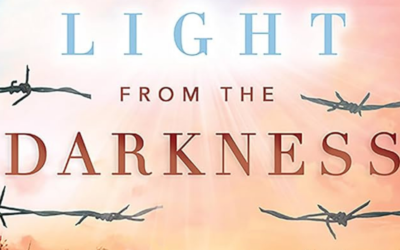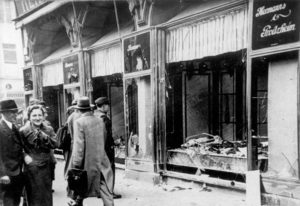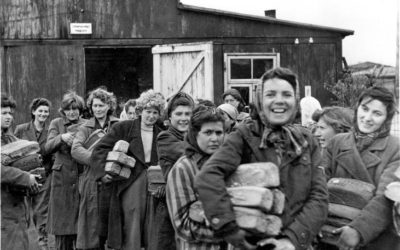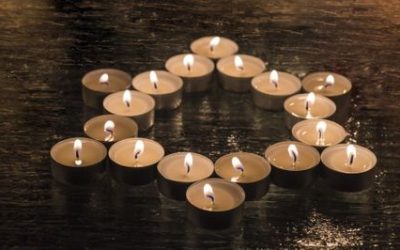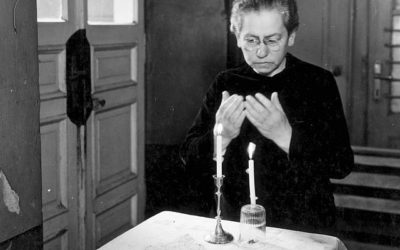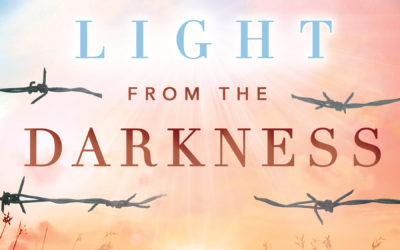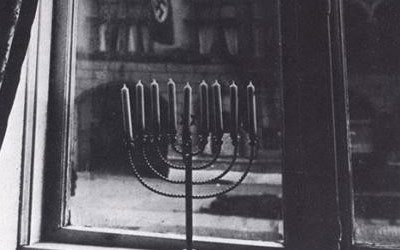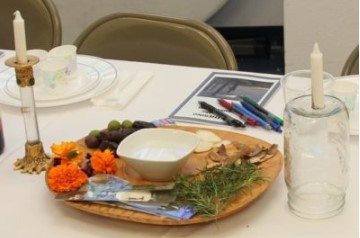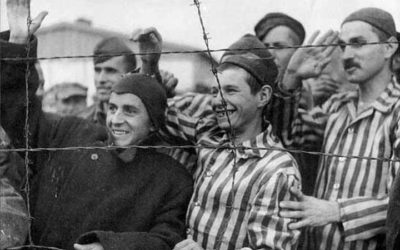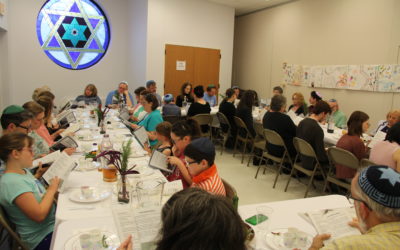The seder is the perfect model for developing a Holocaust commemoration. At the seder, we tell the story of our survival from a great tragedy ….. In a Holocaust commemoration we want to tell the story of our survival from another great tragedy. [Originally published in the Jewish Educator.]
Broken Glass, Preserved Memory
Please don’t let them find out I’m Jewish. Please don’t let them find out I’m Jewish. It is November 10, 1938, and Margot Gunther (Jeremias) is riding the train to school. It’s an hour ride from her home in Hoffenheim, Germany to Heidelberg where her school is. [Redirects to the Times of Israel]
On the meaning of liberation, for the 75th anniversary of V-E day
Seventy-five years ago, death camps and labor camps were liberated one by one as the Allies marched across Europe. On May 8, 1945, the armed forces of Nazi Germany surrendered to the Allies. The Jews of Europe as a people were liberated, freed from their slavery and oppression. Free to emerge from hiding; free from the threat of arrest and murder; free to be Jews again. What does it mean to be liberated? [Redirects to the Times of Israel]
How will we remember the Holocaust when there are no survivors left? Ritual.
Today, another Holocaust survivor passed away. I do not know their name – perhaps you do. Unlike their families who were torn from them before their time, some of these people are dying of natural causes, and others, sadly, of COVID-19. We should not be surprised by this. The Holocaust ended 75 years ago. The youngest survivors are in their 80s.
Yom HaShoah in a time of social distancing
Can we still commemorate the Holocaust on Yom HaShoah in a time of social distancing? Yes! Our new service, Light from the Darkness, allows us to honor the survivors’ memories and to learn from their experiences with a ritual of remembrance that can be performed in our homes. [redirects to the Times of Israel]
How Should We Memorialize the Holocaust?
The Holocaust is in danger of being remembered as just another historical atrocity inflicted on the Jewish people. Traditionally, Yom HaShoah—Holocaust Remembrance Day—has been a time to listen to survivors. Soon, we will no longer be able to sit and listen to them...
What Chanukah teaches us about Holocaust Remembrance
As Chanukah reminds us, Jews are no strangers to persecution. We have been fighting for our right to exist since the beginning of our recorded history. As we say at Passover: “In every generation, there are those who wish to destroy us.” A list of those who’ve tried would be long: Pharaoh, Amalek, Nebuchadnezzar, Haman, Antiochus, Caesar, Torquemada, to name only some. [Redirects to the Times of Israel.]
A new ritual for Yom HaShoah as the fragile window closes
We have reached a tipping point where the Holocaust is changing from an immediate, traumatic memory to community history. At this transition, we have an obligation to frame how we as a Jewish community will commemorate this event for future generations. If we do not create some sort of ritual observance, then I fear that the Holocaust will fade into history, its lessons lost. I brought this idea to a meeting of Jewish educators… [Redirects to the Times of Israel.]
For Memorial Day, Thank You to the Liberators
Suffering does not move armies, but suffering does move soldiers. Much as we might wish it otherwise, World War II was not fought to save the Jews. It was fought to stop aggressive countries … [Redirects to the Times of Israel]
How a New Ceremony Changed My View of Yom HaShoah
Yom HaShoah is typically a somber time to reflect, and for me personally, to be angry at the world. This year was different, however. This year, my congregation hosted a very unique ceremony. My experience at this Seder-like ceremony has opened a whole new view to the holiday.
